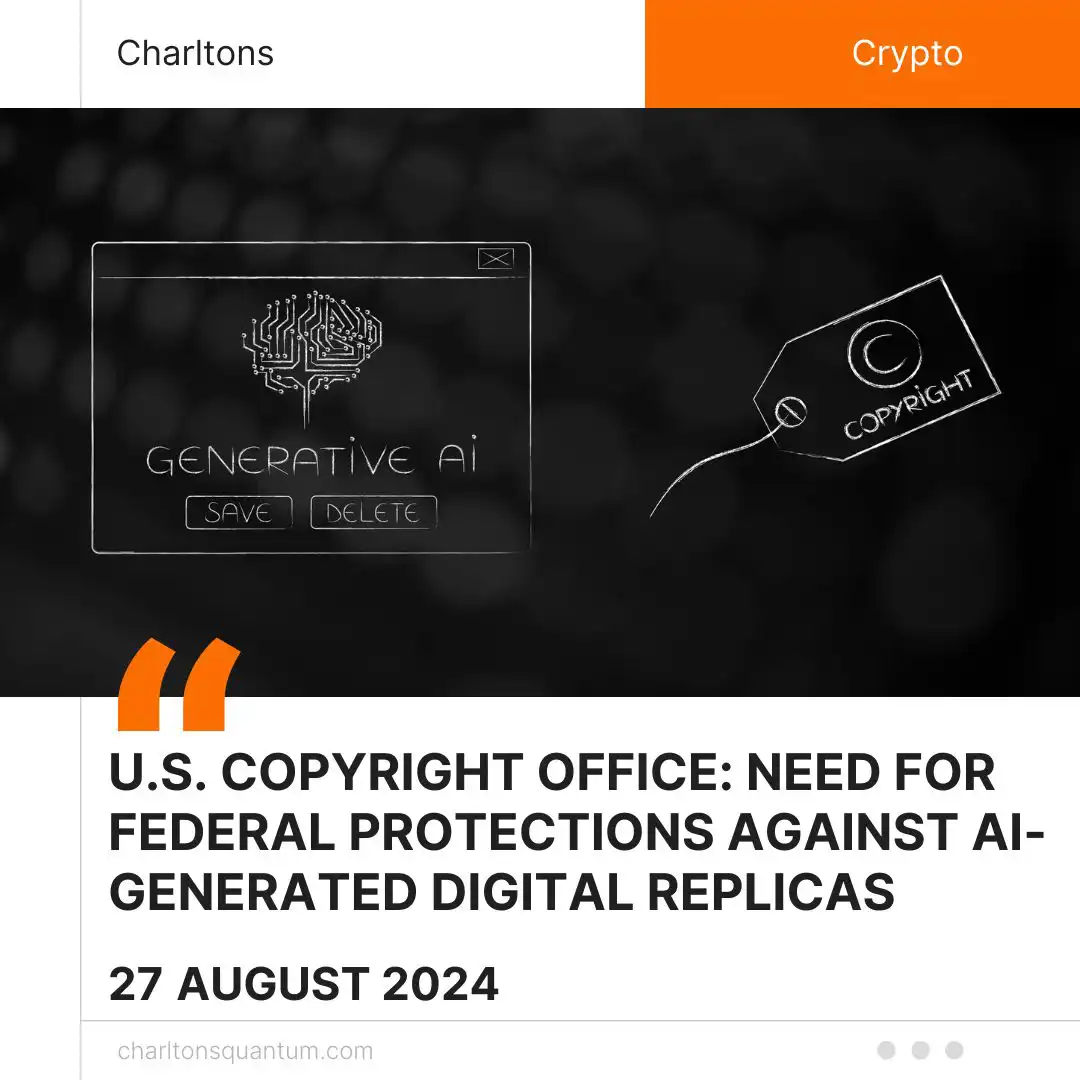
On 15 July 2024, the U.S. Copyright Office released a Report titled “Copyright and Artificial Intelligence, Part 1: Digital Replicas.” The Report explores the complex relationship between copyright law and the rapidly advancing capabilities of artificial intelligence (AI). Specifically, the report focuses on digital replicas, which are realistic digital reproductions of an individual’s voice, appearance, or other personal attributes created using AI technologies. These replicas can be so lifelike that they are often indistinguishable from authentic content. While AI offers exciting opportunities for creative expression, the emergence of digital replicas has raised significant legal and ethical concerns, particularly regarding unauthorised use and the protection of personal identity.
The report identifies several critical lacunas in the existing legal frameworks that fail to adequately address the challenges posed by digital replicas. Firstly, current copyright laws are fundamentally grounded in the concept of human authorship, making them ill-equipped to deal with content generated by AI. Since AI systems can create highly realistic replicas without direct human input, it is unclear who, if anyone, owns the copyright to these creations. This ambiguity creates a legal vacuum where AI-generated digital replicas may not be eligible for traditional copyright protection, leaving the individuals depicted in these replicas vulnerable to unauthorised exploitation.
According to the Report, the existing state-level rights of publicity and privacy are inconsistent and often insufficient to protect against the misuse of digital replicas. These laws vary significantly from state to state, with some offering robust protections and others providing little to no recourse for individuals whose likenesses are digitally replicated without their consent. The report highlights that these discrepancies create uneven protection across the country, allowing bad actors to exploit legal loopholes in jurisdictions with weaker laws.
Another significant gap identified is the lack of federal legislation specifically targeting digital replicas. While some federal laws, such as the Lanham Act or the Federal Trade Commission Act, offer limited protection against deceptive practices or false endorsements, they do not directly address the unique issues raised by AI-generated digital replicas. The report argues that without a comprehensive federal law, there is no uniform standard to prevent or remedy the unauthorized use of an individual’s likeness through digital replicas, leading to potential harm, including loss of income, reputational damage, and emotional distress.
The U.S. Copyright Office recommends several steps for the federal government to effectively address the challenges posed by AI-generated digital replicas. First and foremost, the introduction of federal legislation specifically targeting unauthorised digital replicas coupled with uniform legal framework by creating consistent standards nationwide, the government can prevent the current patchwork of state laws from leaving gaps in protection, thus safeguarding individuals from the unauthorised use of their digital replicas.
Liability mechanisms are also necessary to hold online platforms accountable for distributing unauthorized digital replicas. The legislation should include provisions for secondary liability, with safe harbor incentives for platforms that promptly remove infringing content upon notification.
In addition to liability, the law should provide remedies for those affected by unauthorized digital replicas. These remedies should include injunctive relief and monetary damages, ensuring that individuals can seek justice regardless of their financial resources.
Balancing US First Amendment rights is another important consideration. The legislation should incorporate a framework that protects free speech while preventing the harmful misuse of digital replicas, ensuring that the law does not infringe on fundamental rights.
The U.S. Copyright Office also suggests extending protections beyond an individual’s lifetime. By considering postmortem rights, the government can prevent the exploitation of deceased persons’ likenesses, particularly in the entertainment industry. The government should further strengthen enforcement mechanisms and consider criminal penalties for severe cases of misuse of AI generated digital replicas.
According to the Report, the unchecked proliferation of AI-generated digital replicas poses a serious threat to the foundations of trust, individual rights, and societal stability. Without stringent regulations and legal protections, the line between reality and digital fabrication could blur irreparably, leading to widespread misinformation, exploitation, and harm. The potential for these replicas to be used in malicious ways, such as in deepfake scandals, fraudulent schemes, or to manipulate political outcomes, requires urgent need for action. Economically, the creative industries face the risk of devaluation, while culturally, the very concept of personal identity may become commodified and exploited. To safeguard the integrity of our digital and social systems, it is imperative that governments and policymakers implement comprehensive legal frameworks to address these emerging challenges and ensure that AI technologies are harnessed responsibly. The Report expresses the concern that the current patchwork of state and federal laws in the US is inadequate to protect individuals from the potential harms associated with these technologies.





